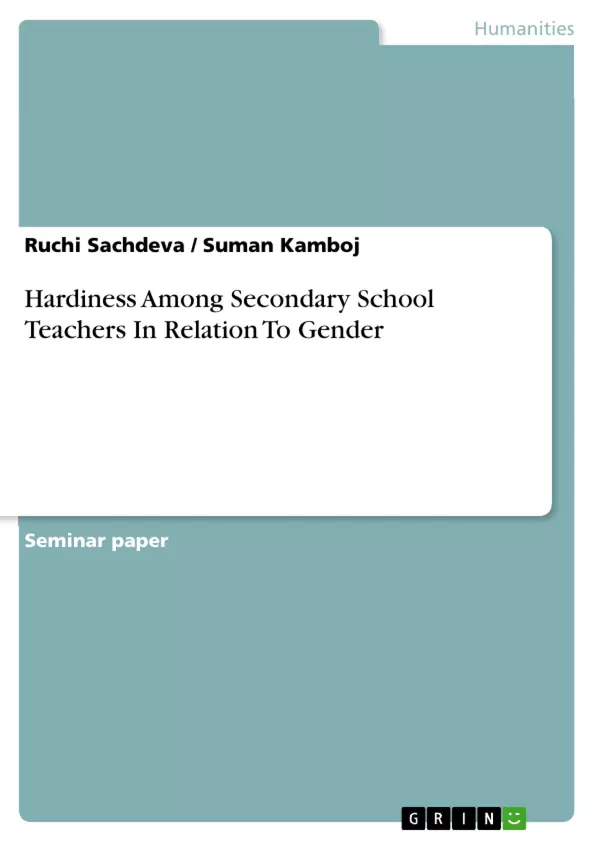The present study was conducted on 100 secondary school teachers to find out gender difference in personality hardiness and its dimensions among male and female secondary school teachers of Fazilka District.
Teachers are of paramount importance in the educational systems of all nations, and the overall progress of a nation largely depends upon the quality of its teachers. From primary to higher education, a teacher is looked upon as an ideal for students. Healthy and motivated teachers have a positive impact on society as a whole because their way of coping with stressful situations undoubtedly also has an impact on student’s attitude and overall school performance.
Teachers, being an important part of the society, also feel stress in their day to day activities. This in turn influences their teaching and influences student’s life. There are some teachers who remain healthy and happy, even in the stressful situations. All this is due to their way of coping with stress.
Inhaltsverzeichnis (Table of Contents)
- INTRODUCTION
- REVIEW OF RELATED LITERATURE
- STATEMENT OF THE PROBLEM
- OBJECTIVES
- HYPOTHESES
- DELIMITATIONS
- METHODOLOGY
- SAMPLING
- RESEARCH TOOLS
- FINDINGS AND CONCLUSION OF THE STUDY
- EDUCATIONAL IMPLICATIONS
- REFERENCES
Zielsetzung und Themenschwerpunkte (Objectives and Key Themes)
This study investigates the relationship between gender and personality hardiness among secondary school teachers in the Fazilka District. It aims to determine whether there are significant differences in hardiness levels and its dimensions (commitment, control, and challenge) between male and female teachers.
- Gender differences in personality hardiness among secondary school teachers.
- The impact of hardiness on teachers' ability to cope with stress.
- The relationship between hardiness and teaching effectiveness.
- The importance of promoting life skills and personal qualities in teachers to enhance their resilience.
- The role of hardiness in mitigating burnout and promoting job satisfaction among teachers.
Zusammenfassung der Kapitel (Chapter Summaries)
- Introduction: This section provides a general overview of the study's background, highlighting the importance of teachers in the educational system and the impact of stress on their well-being and performance. The concept of hardiness is introduced, emphasizing its role as a resilience factor in stressful situations.
- Review of Related Literature: This section examines existing research on hardiness, its relationship to coping strategies, social support, and burnout. It reviews studies investigating hardiness among various professional groups, including nurses and IT professionals, and highlights the potential link between personality hardiness and coping styles.
- Statement of the Problem: This section formally states the research question, focusing on the gender differences in personality hardiness among secondary school teachers in the Fazilka District.
- Objectives: The specific objectives of the study are outlined, aiming to investigate gender differences in personality hardiness and its dimensions.
- Hypotheses: The study's hypothesis is presented, proposing no significant gender difference in personality hardiness and its dimensions among secondary school teachers.
- Delimitations: The study's limitations are clarified, specifying the sample population and geographical scope of the research.
- Methodology: The research methodology is explained, including the use of a descriptive survey method and stratified random sampling to select participants.
- Sampling: The sampling procedure is detailed, outlining the selection of 100 secondary school teachers (50 male and 50 female) from both private and government schools in the Fazilka District.
- Research Tools: The research instrument used to collect data is described, namely the Personality Hardiness Scale (PHS) developed by Kobasa and Maddi.
- Findings and Conclusion of the Study: This section presents the study's findings, focusing on the analysis of gender differences in personality hardiness and its dimensions. It discusses the significance of the results and their implications for understanding the relationship between gender and hardiness among teachers.
Schlüsselwörter (Keywords)
The study focuses on key concepts such as personality hardiness, gender differences, secondary school teachers, stress, coping mechanisms, resilience, and educational implications. The research utilizes the Personality Hardiness Scale (PHS) to assess the hardiness levels of teachers and explores the role of hardiness in promoting teacher well-being and effective teaching practices.
Frequently Asked Questions
What is "personality hardiness" in the context of teaching?
Hardiness is a personality trait that helps individuals, like teachers, cope with stress through commitment, control, and seeing difficulties as challenges.
Are there gender differences in teacher hardiness?
The study specifically explores whether male or female secondary school teachers in the Fazilka District show significant differences in their resilience levels.
How does stress affect a teacher's performance?
Stress can negatively influence teaching quality, student attitudes, and overall school performance, making coping mechanisms like hardiness crucial.
What was the methodology used in this study?
The research used a descriptive survey method with a sample of 100 teachers and the Personality Hardiness Scale (PHS) by Kobasa and Maddi.
What are the dimensions of hardiness?
The three dimensions studied are commitment (involvement), control (influence over events), and challenge (viewing change as an opportunity).
- Arbeit zitieren
- Ruchi Sachdeva (Autor:in), Suman Kamboj (Autor:in), 2016, Hardiness Among Secondary School Teachers In Relation To Gender, München, GRIN Verlag, https://www.grin.com/document/340985



